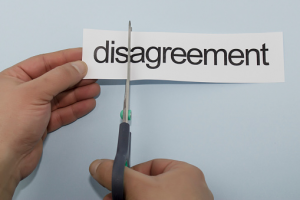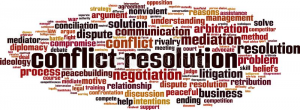Conflict Resolution Day is a global event, intended to promote the concept of peaceful conflict resolution and was created in 2005 by the Association for Conflict Resolution (ACR). It takes place on the 21st October each year.
The main purpose of Conflict Resolution Day is to increase awareness of the various peaceful, non-violent methods of conflict resolution available.
What are these non-violent methods?
Mediation
Mediation is a structured, interactive process where an impartial third party assists disputing parties in resolving conflict through the use of specialised communication and negotiation techniques.
- All participants in mediation are encouraged to actively participate in the process.
- is a “party-centered” process in that it is focused primarily upon the needs, rights, and interests of the parties.
The mediator uses a wide variety of techniques to guide the process in a constructive direction and to help the parties find their optimal solution. A mediator is facilitative in that she/he manages the interaction between parties and facilitates open communication.
When it is used in law, is a form of alternative dispute resolution solution resolving disputes between two or more parties where the mediator assists the parties to negotiate a settlement.
Mediation has a structure, timetable, and dynamics that “ordinary” negotiation lacks. The process is private and confidential, possibly enforced by law. Mediation is becoming a more peaceful and internationally accepted solution to end a conflict. Mediation can be used to resolve disputes of any size.
Arbitration
 In the UK this is most often used by the employment service ACAS where there’s a disagreement (‘dispute’) between an employer and an employee or a group of employees, when a third party can make a decision on the dispute to settle it.
In the UK this is most often used by the employment service ACAS where there’s a disagreement (‘dispute’) between an employer and an employee or a group of employees, when a third party can make a decision on the dispute to settle it.It’s better if both sides of the dispute, or their representatives, can resolve the dispute between themselves first. Both sides should try and work something out together or get help from a conciliator. When this doesn’t work arbitration can help resolve the dispute.
United Nations Women
UNW believes that women’s participation in mediation is essential for achieving lasting, positive peace. Participation in a mediation process can help ensure that more and diverse members of the community become engaged in peace-making. This, in turn, can build the credibility of the process and increase local ownership of the process and its results.
 UN Women – Solutions
UN Women – Solutions
- working to increase the availability of gender expertise and to support greater and more effective participation of women at all levels of conflict resolution to ensure that outcomes are gender-responsive
- working closely with civil society organisations, Member States, and other UN agencies, among others, to increase women’s meaningful participation in peace processes through gathering knowledge and documenting good practices; strengthening women’s civil society organizations to be effective advocates for gender and women’s rights issues in peace processes; and supporting the development of regional networks of women leaders and women mediators
- supporting women’s participation in the peace processes in Syria and Colombia

